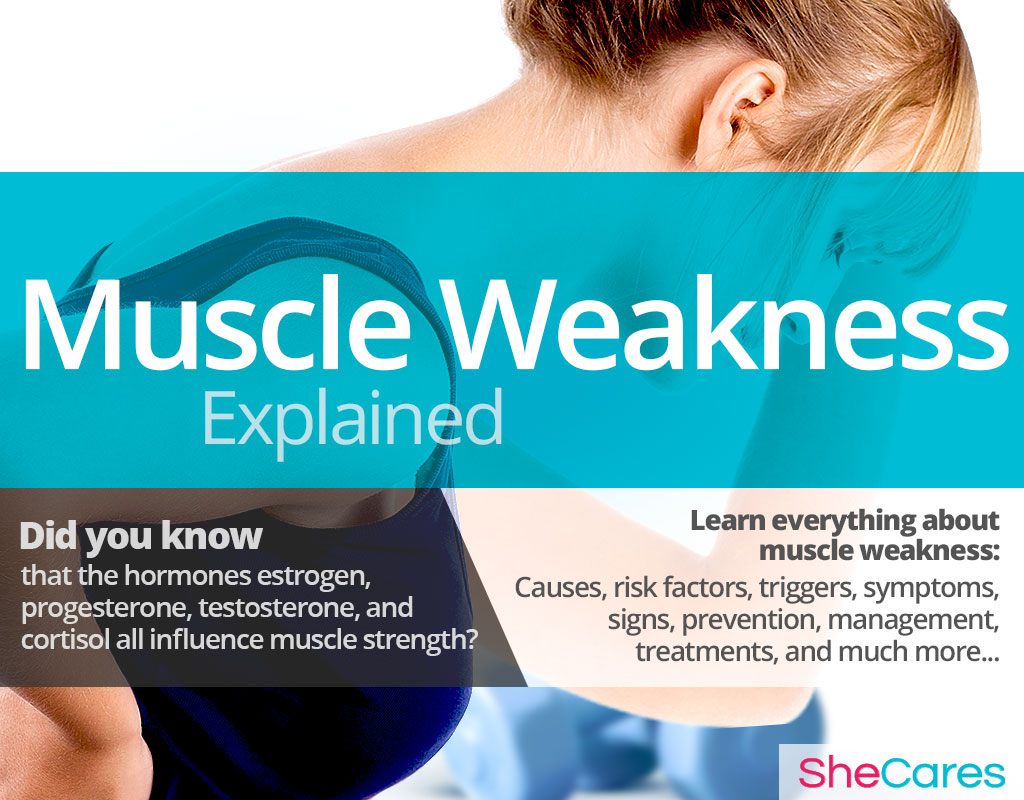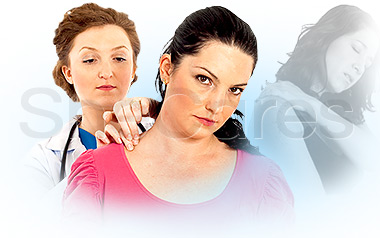About
Quick Facts about Muscle Weakness
- The hormones estrogen, testosterone, progesterone, and cortisol can all influence muscle strength.
- Muscle weakness with aging often has a connection with osteoporosis.
Muscle weakness is defined as a lack of strength, or the feeling that extra effort is necessary to move the limbs. In contrast, muscle fatigue is tiredness or exhaustion that can make moving a chore. Many women experience overlapping symptoms, or do not feel a clear distinction between weakness and fatigue. In either case, hormonal fluctuations could be the cause behind muscular discomfort.
Women are subject to changes in hormone levels - and the symptoms that accompany those changes - during the stages of reproductive life: puberty, pregnancy, post-partum (including breastfeeding), and menopause. Fluctuating levels of both sex and stress hormones can affect muscles as the body grows older.
Identifying Muscle Weakness
It is difficult to accurately establish the different types of muscle weakness since each woman's individual experience can vary greatly. However, there are three criteria that can help identify ways in which this symptom may vary: frequency, duration, and intensity.
Keep reading to find out more about both the hormonal and non-hormonal causes of muscle soreness.
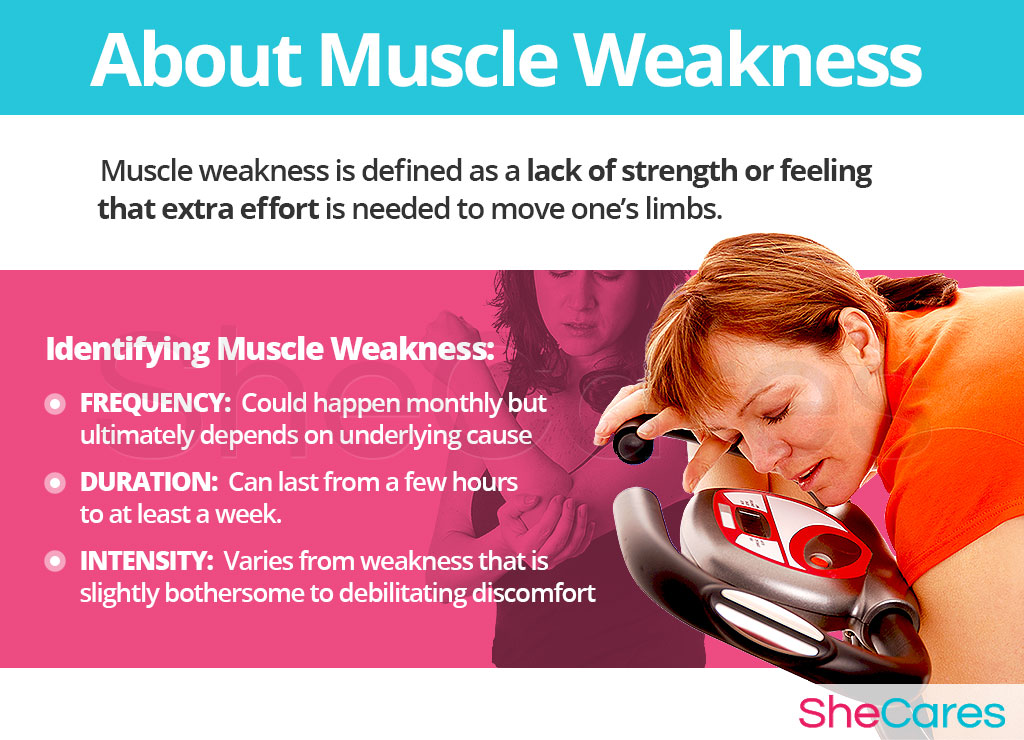
Causes
Muscular weakness can be due to a number of causes, some more obvious than others. For the majority of women going through the menopausal transition, the underlying cause of weak muscles is related to hormonal fluctuations. For others, the symptom might have other causative roots or no apparent triggers whatsoever.
Read on to learn about the hormonal and non-hormonal causes of muscle weakness in greater detail.
Hormonal Causes of Muscle Weakness
Hormones - the body's signal messengers - regulate almost every process in the body, from mood to metabolism to menstruation. When hormones are out of balance - often due to natural fluctuations throughout the course of reproductive life - some symptoms and disorders can arise. The hormones testosterone, estrogen, cortisol, and progesterone all have an effect on muscle tone, mass, and function. A disruption in the levels of any one of these hormones can upset their complex interaction and cause muscle problems.
This interplay of hormones greatly affects muscle function, so times of hormonal flux may result in symptoms of muscular discomfort. Therefore, muscle weakness is more likely to occur during certain stages of the female reproductive life - namely puberty, pregnancy, post-partum, and menopause. See the boxes below for more detail about muscle fatigue in each of these stages.
Puberty, the stage in which a young woman's body begins developing and secreting reproductive hormones in waves. These hormone fluctuations, as well as other factors, can cause muscle pain.
Pregnancy brings drastic hormonal changes in order to support the growing baby. The accompanying fatigue and weight gain can cause muscular discomfort.
Postpartum and the breastfeeding phase is another time of hormonal imbalance, an especially drastic change after the elevated hormone levels during pregnancy. These hormonal changes, as well as other factors, can make muscles sore or lead to more severe hormonal disorders, which in turn cause muscle weakness.
Menopause is the stage when levels of reproductive hormones gradually decline and menstruation begins to cease entirely. During this time, muscle weakness is most often caused by a hormonal imbalance, but other factors can also influence muscle strength.
Other Less Common Causes of Muscle Weakness
While muscle weakness and muscle pain are commonly caused by a hormonal imbalance, other much less common disorders can also lead to muscular discomfort, such as thyroid disorders and other forms of muscular dystrophy.
Continue reading to learn more about the risk factors and triggers that can affect the development of muscle pain.
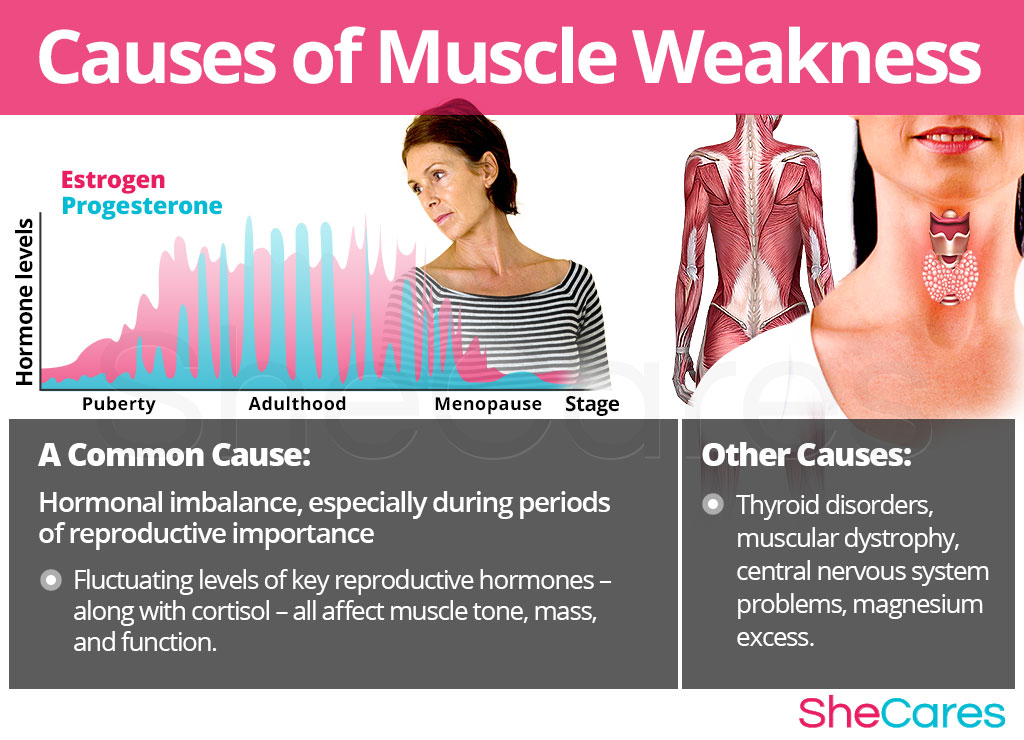
Risk Factors and Triggers
Risk Factors for Muscle Weakness
Some women are more prone to muscle fatigue than others because of certain psychological, behavioral, and health factors - such as anxiety, inactivity, and diet. These factors can influence a woman's hormone levels, or they may have a direct effect on the muscles.
Triggers of Muscle Weakness
Some risk factors may make women more susceptible to muscle weakness; triggers, on the other hand, are factors that immediately (or very soon after) provoke a feeling of pain, tension, or weakness. Avoiding these triggers as much as possible can help prevent or reduce muscle soreness.
Keep reading to learn more about the signs and symptoms of muscle weakness in order to know what treatment would be best depending on the cause.
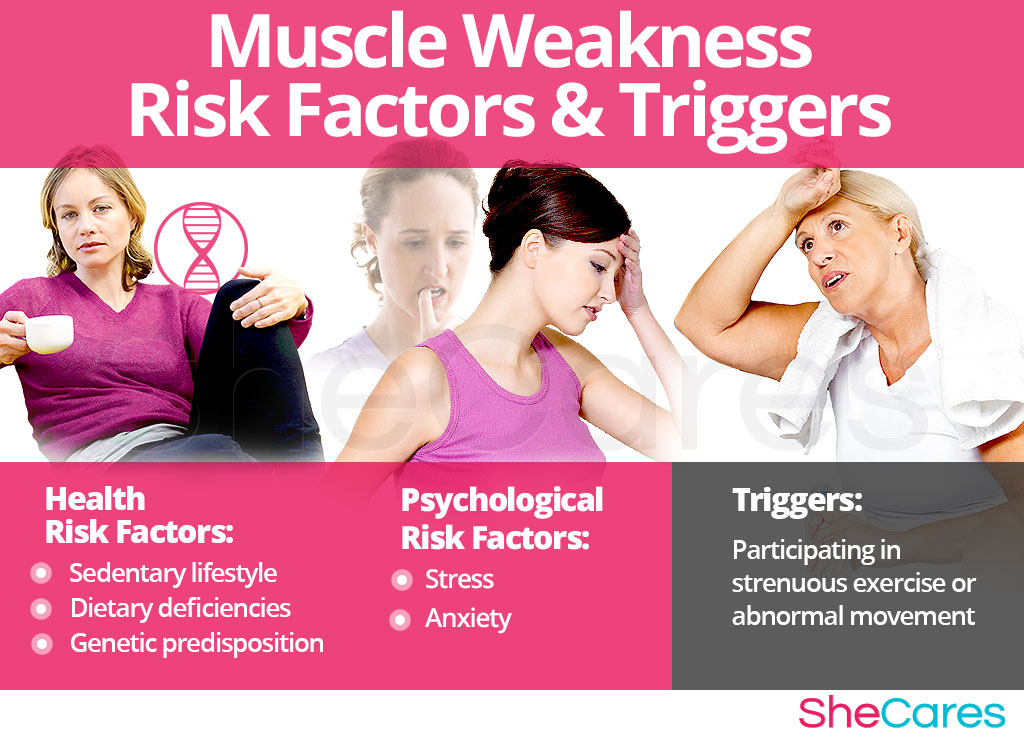
Signs and Symptoms
The symptoms a woman experiences in regards to her muscular discomfort will vary, depending on if she feeling more of weakness, fatigue, or soreness. In any case, many women who are experiencing a hormonal imbalance also feel some type of muscle pain.
Common Symptoms of Muscle Weakness
- Difficulty in moving muscles
- Lack of muscle control
- Muscle tenderness
- Muscle spasms
- Sharp, tingling sensations
- Fatigue
Along with these general symptoms, women may experience other symptoms depending on the type of hormone imbalance or imbalances that are occurring in the body. Both estrogen and testosterone deficiencies can result in a loss of muscle mass and contractibility. In addition, muscle fatigue can be connected to some psychological symptoms, such as anxiety.
Signs of Muscle Weakness
In contrast with symptoms experienced by the patient, medical signs are criteria that a doctor will assess during an examination to better understand the symptoms and diagnose the disorder. The doctor will typically measure the following aspects when considering muscle weakness:
- Abnormal blood levels of reproductive hormones, especially a deficiency
Muscle strength, graded on the following scale:
- Grade 0: No muscle contraction
- Grade 1: Muscle flicker, but no movement
- Grade 2: Movement possible, but not against gravity
- Grade 3: Movement possible against gravity, but not against resistance by the examiner
- Grade 4: Movement possible against gravity and some resistance by the examiner
- Grade 5: Normal strength, active movement against gravity and full resistance
Diagnosis of Muscle Weakness
In order to examine the signs and diagnose the disorder, a physician will typically carry out several procedures during an examination. First, he or she will ask about the patient's medical history, then perform a physical exam to test muscle strength, and sometimes do a psychological evaluation. Additional tests will be ordered if needed.
Complications of Muscle Weakness
Muscle weakness due to a loss of muscle mass can lead to reduced contractibility and mobility. In other cases, the chronic combination of muscle problems, fatigue (especially chronic fatigue syndrome), and underlying psychological issues can lead to depression and other severe mental disorders. However, this only happens in rare cases of chronic weakness.
Women whose muscle weakness impairs their daily activities may wish to treat it or at least manage it. Alternatively, women in a life stage of hormonal imbalance may want to take steps to prevent muscle weakness. Read on to learn about techniques and methods to prevent and manage muscle problems.
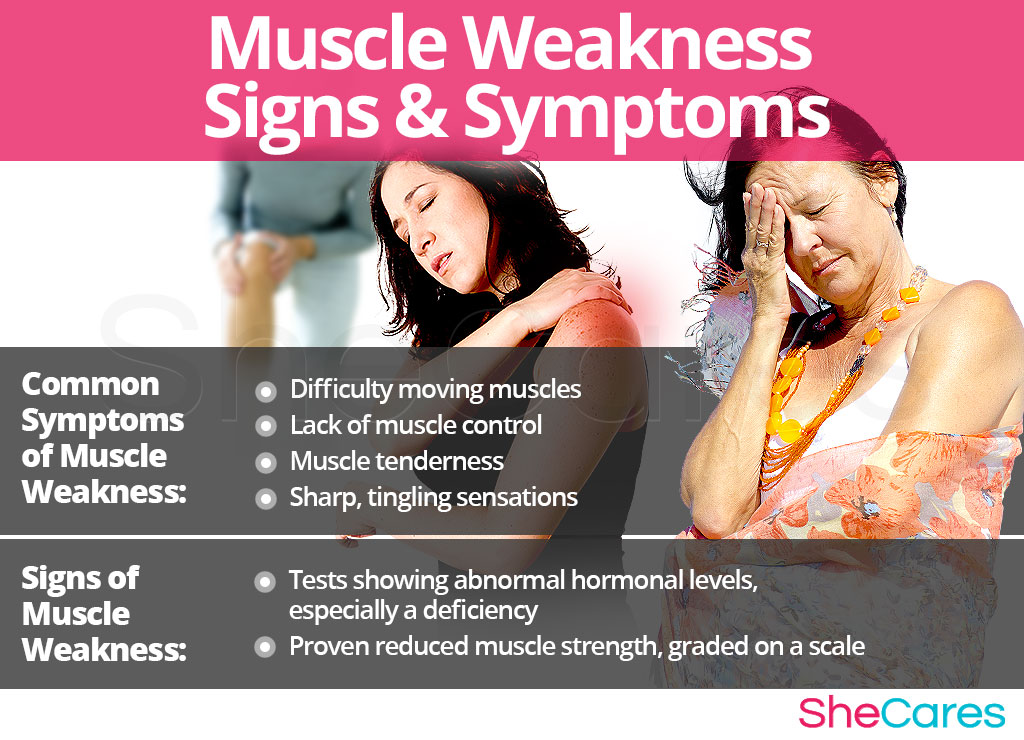
Prevention and Management
Preventing Muscle Weakness
There is no one surefire way to prevent muscle weakness entirely, just as there is no way to hold back natural hormonal fluctuations and processes. However, there are measures women can take to reduce the chance of developing severe muscle weakness, or to manage the soreness if it occurs.
Lifestyle adjustments - including those regarding diet, exercise, and habits - can have a great effect in preventing muscle weakness. These lifestyle changes can be supported by taking supplements that nourish the hormone-producing glands and thereby balance hormone levels.
When muscles are already feeling weak, a woman may wish to manage the symptoms to feel stronger and more mobile. Keep reading to find out more about management techniques for muscle weakness.
Managing Muscle Weakness
There are ways to manage muscular discomfort when experiencing muscle weakness, soreness, pain, or tension. These general tips are methods that all women can use, at any age. The best management technique depends on the kind of discomfort a woman is experiencing.
Alternative Management Tips for Muscle Weakness
Some alternative methods may also help in managing muscular discomfort. Although they do not address the hormonal imbalance behind many cases of muscle weakness, they often help reduce stress and tension. These techniques include massage and acupuncture.
These measures may help reduce muscular discomfort, but they do not address the origin of the problem, which many times is an underlying hormonal imbalance. However, several natural treatments that focus on the hormonal causes are available for muscle weakness. Keep reading to learn about the different approaches to treat muscle weakness and what kinds of treatments come with each approach.
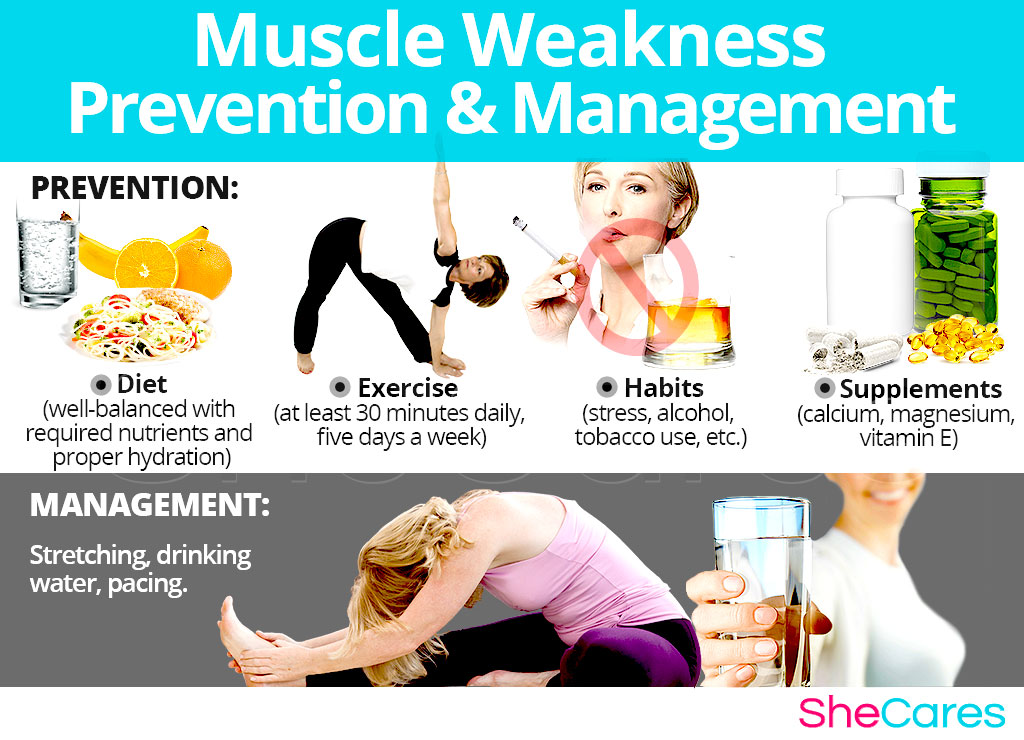
Treatments
Muscle weakness, which in many cases is due to a hormonal imbalance, can affect the quality life of any woman who suffers from it, especially during menopause. Fortunately, effective treatments are available for relieving muscle discomfort.
Three Approaches to Treat Muscle Weakness
Treatment of muscle problems can be approached on three levels. These are categorized as: (1) Lifestyle Changes, (2) Alternative Medicine, and (3) Pharmaceutical Options.
Women are urged to begin with the least risky approach to muscle weakness treatment - lifestyle adjustments - and then proceed to the next level. While pharmaceuticals are usually not necessary to treat muscle weakness, some women who are unable to find relief from lifestyle changes and alternative medicine may wish to consider medical intervention, after properly evaluating the risks associated with such a treatment.
Lifestyle Changes for Muscle Weakness
The first level of treatment entails the least amount of risk but also the most self-discipline. Small lifestyle changes can help with all muscular discomfort, whether it is weakness, cramps, aches, pain, or soreness. A healthy diet, regular exercise, and healthy habits are the keys to lifestyle adjustments.
These changes may help reduce the symptoms of muscle weakness, but they do not necessarily address the hormonal imbalance that underlies many cases of muscular discomfort, so further treatment may be desired. Alternative medicines are an excellent way of treating muscle weakness naturally and safely.
Alternative Medicine for Muscle Weakness
Alternative supplements and medicine involve very little or no risk, but they can also be a very efficacious way to treat muscle problems. Regarding herbal supplements, there are two principal kinds that can be taken: phytoestrogenic and hormone-regulating herbal supplements.
Phytoestrogenic herbal supplements
Estrogenic compounds contained in some plants such as soy are used to compensate for a deficiency in estrogen. This can help relieve hormonal imbalances, a common cause of muscle weakness.
These supplements are primarily effective for women in perimenopause, who more commonly have low estrogen levels. Such herbs may not be effective for women in other life stages, such as pregnancy.
Hormone-regulating herbal supplements
These supplements, including Macafem, stimulate natural hormone production in the body by supporting the ovaries and endocrine glands, which allows the system to produce hormones more efficiently. This results in a balance of not only estrogen, but also all of the hormones that influence muscle weakness.
Such supplements can be considered the safest and most natural way to treat hormonal imbalances, and because they promote natural hormone production, they can be taken throughout a woman's life.
In addition, some other supplements can aid in the treatment of muscle pain, or at least make it more manageable. These include vitamins and other natural herbs.
Typically, lifestyle changes combined with alternative medicine is the most effective treatment to relieve symptoms of muscle weakness while addressing the underlying cause. However, some women may experience symptoms so severe that the next level of treatment becomes necessary.
Pharmaceutical Options for Muscle Weakness
Medical treatments usually entail the highest risk and the highest expense. These treatments may not be appropriate for all women at every life stage. In addition, many require a prescription, so it is best to speak with a doctor before beginning any kind of pharmaceutical treatment.
Medical options usually involve one of two types of treatment: hormone-balancing medication and treatments for underlying disorders.
These three levels of treatment - lifestyle changes, alternative treatments, and pharmaceutical options - are not mutually exclusive. Women may use different approaches at different times or a combination of treatments, depending on the nature of the symptoms. Many find that symptoms of muscle weakness are best alleviated by employing a combo of healthy lifestyle adjustments and alternative medicine.
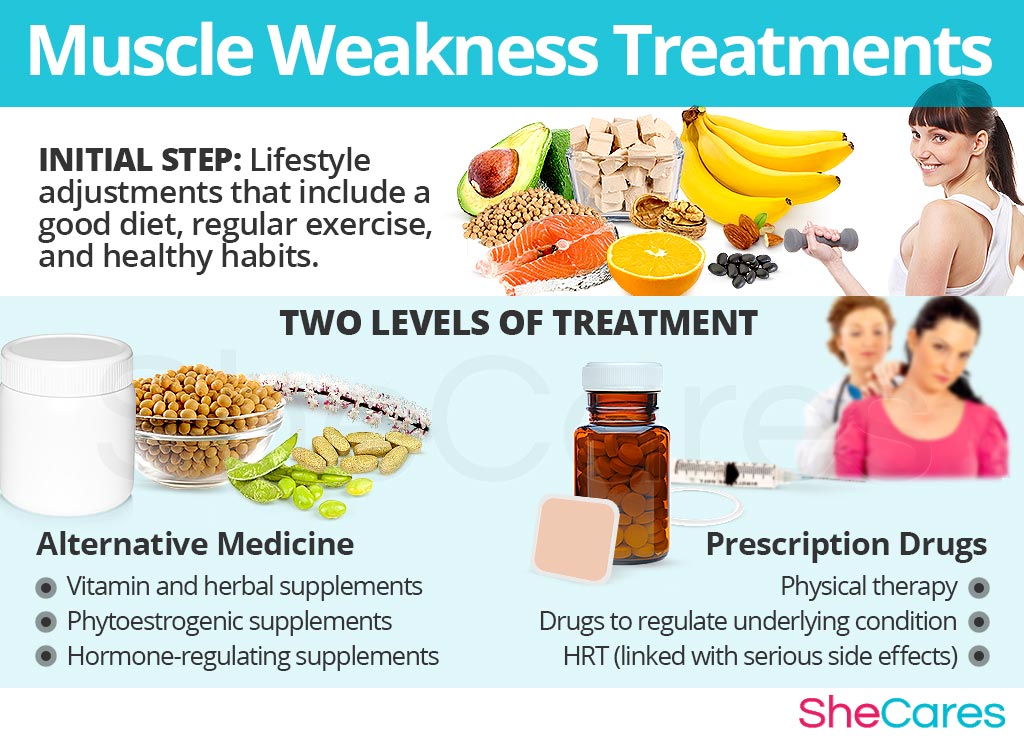
Sources
- Ciesla, N. et al. (2011). Manual Muscle Testing: A Method of Measuring Extremity Muscle Strength Applied to Critically Ill Patients. Journal of Visualized Experiments, 50, 2632. doi: 10.3791/2632
- John Hopkins Medicine. (n.d.). Postpartum Thyroiditis. Retrieved October 3, 2017, from http://www.hopkinsmedicine.org/healthlibrary/conditions/endocrinology/postpartum_thyroiditis_85,P00425
- Lowe, D.A. et al. (2010). Mechanisms behind Estrogens' Beneficial Effect on Muscle Strength in Females. Exercise and Sport Sciences Reviews, 38(2), 61-67. doi: 10.1097/JES.0b013e3181d496bc
- Maltais, M.L. et al. (2009). Changes in muscle mass and strength after menopause. Journal of Musculoskeletal & Neuronal Interactions, 9(4), 186-197. Retrieved October 3, 2017, from https://www.ncbi.nlm.nih.gov/pubmed/19949277
- Mayo Clinic. (2016). Chronic Fatigue Syndrome | Pregnancy week by week. Retrieved September 21, 2017, from http://www.mayoclinic.com/health/chronic-fatigue-syndrome/DS00395/DSECTION=causes | http://www.mayoclinic.com/health/leg-cramps-during-pregnancy/AN02132
- National Institutes of Health. (n.d.). Magnesium. Retrieved September 21, 2017, from http://ods.od.nih.gov/factsheets/Magnesium-HealthProfessional/
- Sipila, S. et al. ( 2013).Sex hormones and skeletal muscle weakness. Biogerontology, 14(3), 231-245. doi: 10.1007/s10522-013-9425-8
- University of Maryland Medical Center. (n.d.). Premenstrual syndrome. Retrieved October 3, 2017, from http://www.umm.edu/health/medical/altmed/condition/premenstrual-syndrome
- U.S. Department of Health and Human Services. (2012). Menopause and menopause treatments fact sheet. Retrieved October 3, 2017, from http://www.womenshealth.gov/publications/our-publications/fact-sheet/menopause-treatment.html
